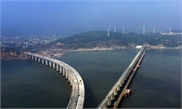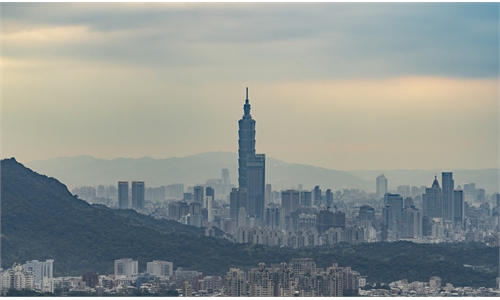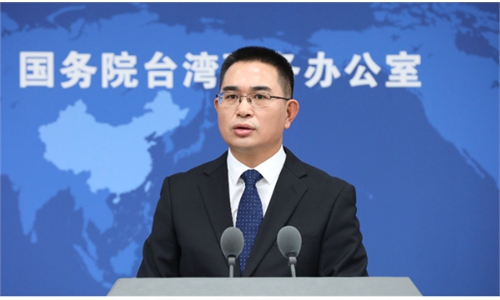Mainland 'legitimate' in mulling halting tariff cuts on more Taiwan imports; 'DPP's hostile policy root cause of friction'

A view of the Taiwan Straits is seen from Xiamen port, in East China's Fujian Province. Photo: IC
The Chinese mainland's plan to contemplate suspending tariff concessions for more products imported from Taiwan in response to the island's trade restrictions and political maneuvering is legitimate and in line with WTO rules, experts said, urging the Democratic Progressive Party (DPP) authorities to take concrete measures to lift trade restrictions on the mainland and avoid hurting Taiwan residents and businessmen's interests.
The mainland's plan of cutting preferential tariffs came after political maneuvering by the DPP authorities, whose willingness and ability to develop the regional economy were put in doubt, analysts pointed out.
On Tuesday, the Ministry of Commerce of China (MOFCOM) said that after the mainland announced the decision in December to suspend preferential tariffs on 12 chemicals from Taiwan under the Economic Cooperation Framework Agreement (ECFA) in response to the DPP authorities' restrictions on mainland exports, the DPP did not take any effective measures to lift those restrictions but instead is engaged in political maneuvering to divert blame and shirk responsibility. .
Relevant departments are studying the further suspension of preferential tariffs on fishery products, machinery, auto parts, textiles and other products in line with the ECFA, the MOFCOM said.
Many Taiwan business representatives see the DPP authorities as the biggest obstacle to normal cross-Straits economic and trade activities, the Global Times has learned.
Business leaders of the Taiwan island called for strengthening cooperation and investment with the Chinese mainland market and companies, describing closer collaboration across the Straits as "an irreversible trend for the best interests of the Taiwan island."
Given the vast market of the mainland, Taiwan businesses are certainly not inclined to relinquish their presence, Lee Cheng-hung, president of the Association of Taiwan Investment Enterprises on the Mainland, told the Global Times.
"The mainland has a massive market of 1.4 billion people. With such a vast market, I believe the business and industrial sectors in Taiwan eagerly anticipate continued positive developments across the Taiwan Straits. I think this is the overall trend," Lai Cheng-i, chairman of the General Chamber of Commerce of the Taiwan island, told the Global Times on Tuesday.
The Chinese mainland remains Taiwan's largest export market and source of trade surplus, and it is also Taiwan's most crucial destination for outbound investment, official data showed.
Lu Pen-Chin, president of the Taiwan Compatriot Investment Enterprises Association of Changzhou, also sees vast opportunity in the fast-developing mainland market, noting that strengthening cross-Straits cooperation and exchanges is imperative.
However, what has always been the concern for businesspeople from Taiwan in recent years was that cross-Straits relations have seen rising tension, with the DPP intensifying its move to obstruct related economic and trade activities between the mainland and the island, including refusing to resume more direct cross-Straits flights, business representatives said.
Businesspeople also fear that normal economic and trade activities with the mainland could face further disruption due to the DPP authorities' ongoing and foreseeable hostile policy and separatist stance.
Lee said that he is worried that the DPP lacks investigation into trade issues with the mainland. If the DPP remains in power, it will undoubtedly severely impact cross-Straits economic and trade cooperation. Lee also hoped that the island could restore in-depth exchanges with the mainland in various fields.
Businesses from Taiwan that invest and operate in the mainland hope for peaceful, stable and prosperous cross-Straits development, and desire increased communication and cooperation between the two sides. "But the DPP's policies targeting the mainland have posed big concerns for us," Lai said.
The Chinese mainland has vigorously implemented supporting policies for Taiwan enterprises, allowing them to share the dividends of the mainland's fast development, in stark contrast to the DPP's secessionist rhetoric and actions.
On Monday, the mainland outlined 14 measures in five economic and trade areas to support East China's Fujian Province in exploring new paths for integrated cross-Straits development with the Taiwan island.
In contrast, the DPP imposed restrictions on cross-Straits exchanges during the pandemic and has not yet fully restored visits by cross-Straits delegations, causing inconvenience for businesses from Taiwan, Teng Tai-Hsien, secretary-general of the Straits Economic & Cultural Interchange Association, told the Global Times.



